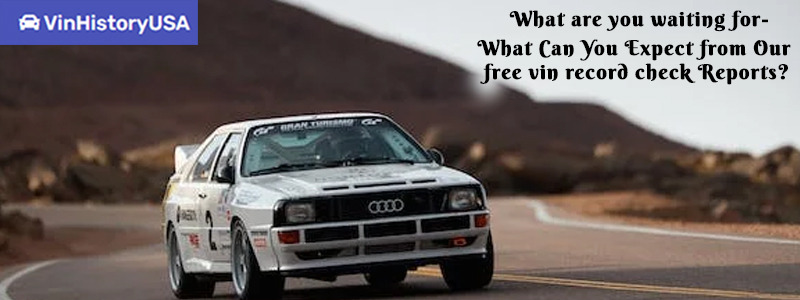Title Check
Our records make it easy to obtain car title history. It will tell you if the vehicle’s title is branded. This will help you make an informed decision about the purchase of a vehicle. The title can give you some useful information about the vehicle.
Problem Checklist
You will be able to find out everything about your vehicle and even its problems. It will let you know if your vehicle is a lemon. You can find the vehicle’s reconstructed information in our reports. These problems cannot be found if you physically inspect the vehicle. Trusted sources provide these pieces of information after you have completed the VIN Lookup.
Accident History
You can now do a VIN number check to find out about the accident history of your vehicle. This will allow you to determine how many accidents your vehicle has been in. It will also tell you how much damage it sustained during these accidents.
Service History
Find out your vehicle’s service history by downloading a Car History Report. It is important to know how long your vehicle has been in service. This will allow you to view any dealer maintenance or other service records. This will allow you to determine when your car should be serviced.
Who is the owner of a lien on a vehicle- free car lien check texas:
The lien holder for your car is the auto loan lender. They may also hold the title. The lien holder may file the lien with the department of motor vehicles or transportation agency in your state depending on where it is located. The lien holder usually sends a lien release form (depending on where you live) to the state transportation agency to update the title and transfer the car to you.
A lien holder is the legal owner for your vehicle. It can take your vehicle if your loan defaults. To further protect themselves, lienholders can demand that you have certain types of auto coverage — usually comprehensive or collision coverage — until your loan is paid off.
A mechanic might also be allowed to put a lien on a vehicle in some states. If mechanics aren’t paid within a certain time frame, they can put a lien on the car.
Buying and selling a car with an lien
If you are purchasing a used car from someone but they don’t actually own it, you won’t usually be able to get the title until the seller has paid off the car loan and the lien holder has transferred the title.
Similar to above, if you plan to sell a car you will need to pay off the loan to get the title transferred. Then you can transfer it to the buyer.
You, and not the lien holder, will be able to take possession of the title if you are located in a non-title-holding country. The information of the lien holder may be displayed on the title depending on where you live. It might also need to take steps to release the lien after you have paid off your loan. In New York, for example, the lender must provide a release form if you are able to pay your car loan completely. This document must be attached to your car’s title before you can sell it.
Contact your lien holder if you are unable to afford to sell your car. Your lien holder may be able to make the check payable to the buyer for the remainder of the loan amount. Then, the buyer will receive the car’s title.
Where can you find information about lien?
You should verify the lien status of any used vehicle you are considering buying from a private seller. You have a few options to check this.we also provide you with free vin check oregon.
- Contact your state’s transportation agency. Online lien searches can be done by some state DMV websites using your vehicle identification number (VIN). This 17-digit number can be found on the windshield of a car, under the hood, or at the door that closes for the driver. It could also be found on your car’s registration card or insurance documents.
- Look at your car title if you have it. The lien holder might be listed on the title if there is a lien on your car.
- A vehicle history report is required. A vehicle history report will provide information on the lien history as well as important details such as odometer readings and any previous owners. This is vital information if you are considering buying the car. The National Motor Vehicle Title Information System (Autocheck), and Carfax are all providers of vehicle history reports.



